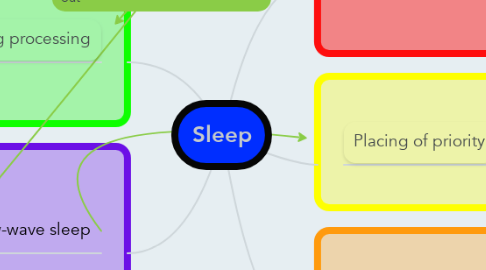Sleep
by Sean Langan


1. REM sleep focused research
1.1. REM sleep cannot effectively connect sleep and procedural learning
1.2. REM is less important than slow-wave sleep
1.3. More exciting to researchers therefore more effort was placed in its study than other phases of sleep
2. Sleeping increasing processing
2.1. Process information previously learned
2.2. Sleep builds upon memories
2.3. The phenomenon of waking with an answer to a problem
3. Placing of priority
3.1. Chunks information
3.2. More difficult the learning the higher the priority
3.2.1. Research showed improvements of more difficult tasks after sleep
4. Slow-wave sleep
4.1. Four distinct stages
4.1.1. Range beginning from drowsiness and progressing to deeper levels
4.1.2. Begin after REM/ deeper sleep than REM
4.2. Different stages affecting different learning
5. Sleeping mysteries
5.1. REM sleep remains a mystery and function is still relatively unknown
5.2. Contradictory evidence linking REM to learning
5.2.1. some believe it strengthens memories
5.2.2. some believe allows processing of information without "rational" thought constraints
